ALPS In Brief Podcast - Episode 88: The Value and Community of Bar Partnerships ft. Bob Paolini of VT
In this mini episode of ALPS In Brief, our Bar & Affinity Partner Strategist Rio Peterson sits down with Bob Paolini, Executive Director at the...
We've crafted solutions tailored to your firm
The world of insurance for law firms can be confusing, and difficult to navigate. We've created this glossary because these common insurance terms should be easy to understand.
12 min read
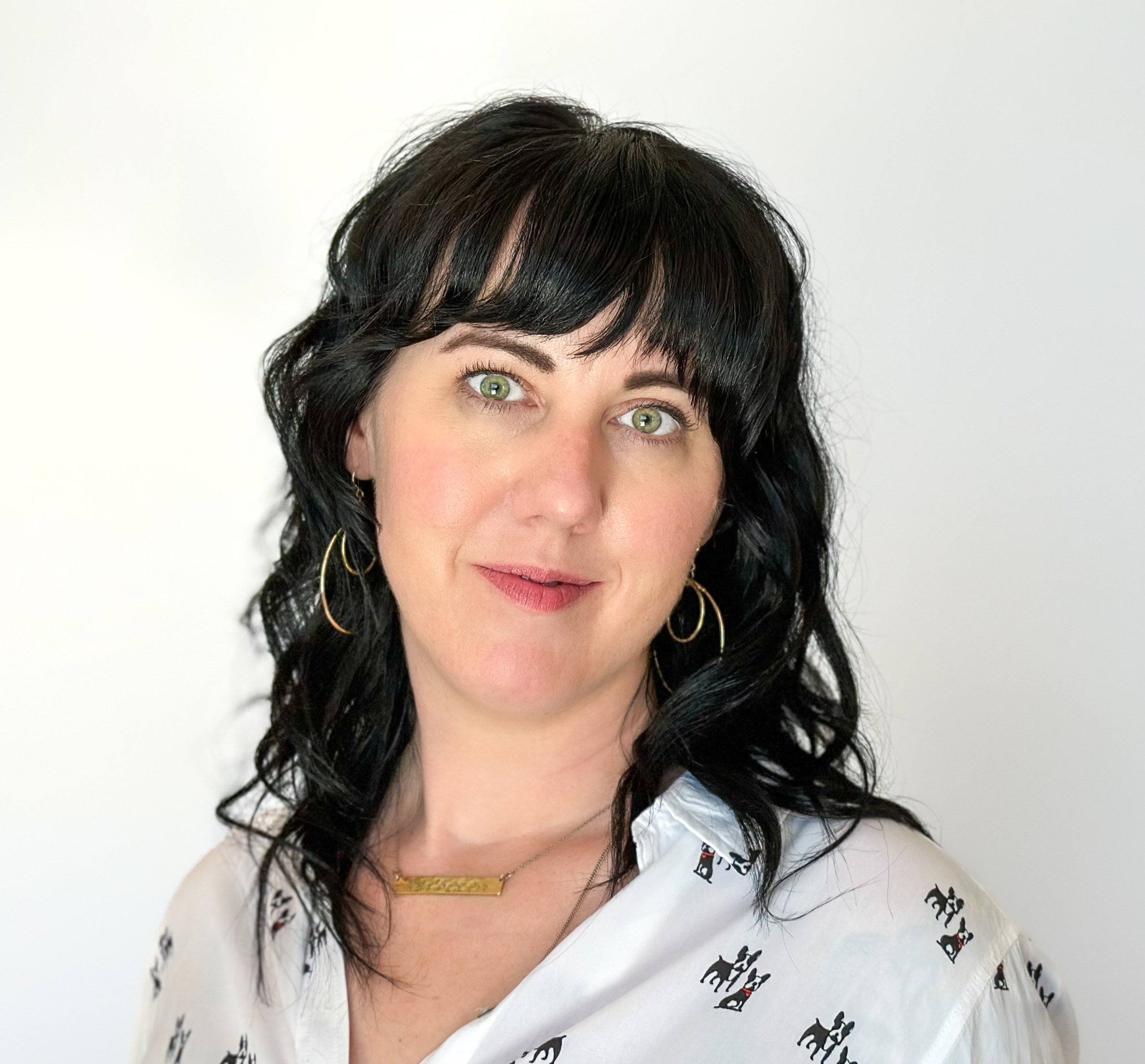 Rio Laine, Director of Strategic Partnerships
:
Posted on December 12, 2024
Rio Laine, Director of Strategic Partnerships
:
Posted on December 12, 2024
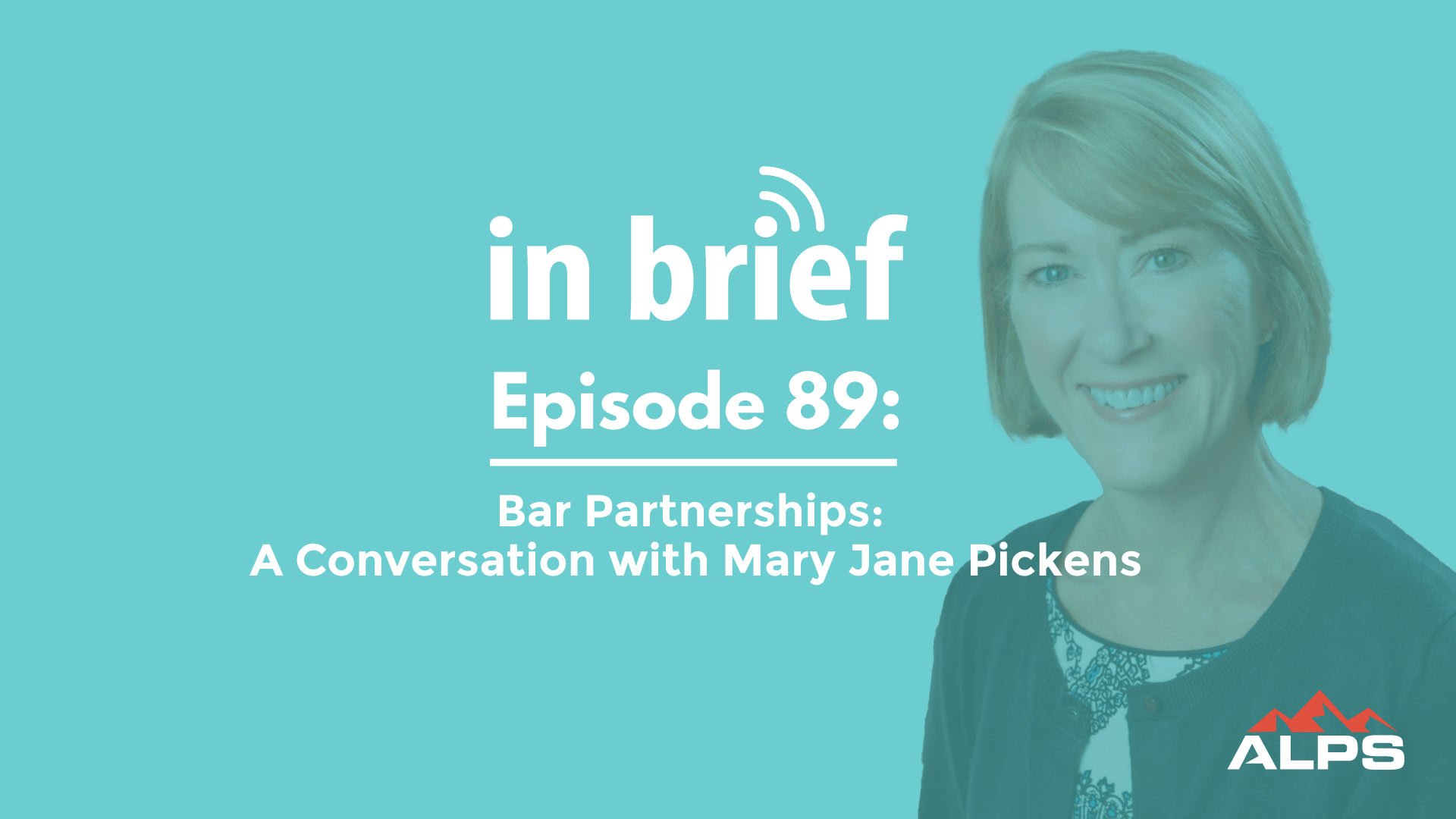
In this mini episode of ALPS In Brief, our Bar & Affinity Partner Strategist Rio Peterson sits down with Mary Jane Pickens, Executive Director at the West Virginia State Bar to discuss the importance of bar partnerships, how they create value for members, and the pivotal role bars play in the legal community.
—
Transcript:
Rio Lane:
All right. Hello everybody. We are back for another mini-installment of the ALPS in Brief podcast. I am your host, Rio Lane, and I am talking today with Mary Jane Pickens, who's the executive director of the West Virginia Bar. Hi.
Mary Jane Pickens:
Hey, how are you?
Rio Lane:
I'm good. How are you doing?
Mary Jane Pickens:
Wonderful. Very, very happy to be back in Montana. It's a beautiful, beautiful place.
Rio Lane:
Wonderful. Yes. Thank you for joining us. I'm happy you're here too. I love Missoula. It's such a lovely city.
Mary Jane Pickens:
It is. It's fun. We went out and just took a quick walk this morning, and it's a wonderful little place. Lots of good stuff here.
Rio Lane:
It is. It absolutely is. Yeah. So tell me a little bit about yourself, Mary Jane. What's your background, and how did you come to the Bar Association?
Mary Jane Pickens:
Well, I've done a lot of different things. When I first became an executive director, I went to one of the ABA annual meetings, and they had us a boot camp for brand new executive directors, and you had to pick out a song. It was an icebreaker thing, and they would play your song and you were supposed to jump up and say, "That's my song." And my song was Long and Winding Road by the Beatles.
Rio Lane:
Oh, nice.
Mary Jane Pickens:
Because I felt like I had had a rather long and winding road to get to the bar. I graduated from law school. I went to Ohio Northern University, so I did not go to law school in West Virginia. Came back to West Virginia because it's my home, and went into private practice in a small firm, kind of a little boutiquey... We mostly did bankruptcy work. And did that for about 15 years and decided I needed a change and had an opportunity to go to the Insurance Commissioner's office in the state of West Virginia. And shortly thereafter, became general counsel for the West Virginia Insurance Commissioner. And I was there for about 11 or 12 years. And then I went to a large firm, did mostly government relations and lobbying mostly around the insurance industry.
Rio Lane:
Yeah.
Mary Jane Pickens:
Did that for about three years. And then because I love public service, it's where my heart is, I had a chance to go back to the state and be the executive director of the West Virginia Board of Risk and Insurance Management, which provides all of the property and liability insurance for the state of West Virginia, and also simultaneously be the Deputy Cabinet Secretary for the Department of Administration, which provides all the back office-y stuff and services for the rest of government.
Rio Lane:
Oh, wow.
Mary Jane Pickens:
And I was able to be acting cabinet secretary during 2016 during Governor Earl Ray Tomblin's last year, and then had a chance to go to the state bar, and that's where I am now. So it's kind of a long and winding road.
Rio Lane:
Yeah, yeah. That's really interesting. And you've been at the bar for two years?
Mary Jane Pickens:
Yes. I hit my two-year official mark on July 1.
Rio Lane:
Oh, congratulations. Congratulations.
Mary Jane Pickens:
Thank you.
Rio Lane:
Yeah. How are you liking it? Do you find it's a lot different than what you were doing before?
Mary Jane Pickens:
It is a lot different. It's still considered a state agency, but it's in the judicial branch. I've always been in the executive branch, so there's a lot of differences there. But it still is that public service feeling like you have constituents, you have customers, and you're there to help folks. And so that's what I love about it.
Rio Lane:
Yeah, that's fantastic. How do you find working with a board? Because I know you've got a board of folks that helps guide things. Yeah. Do you find that to be helpful, or do you find it's different than...
Mary Jane Pickens:
Well, we had a board at the Board of Risk and Insurance Management, but they were very different. They were rather hands-off.
Rio Lane:
Oh, okay.
Mary Jane Pickens:
So this board is a lot more engaged, which I think is a good thing.
Rio Lane:
Yeah.
Mary Jane Pickens:
We only have four quarterly meetings, but we have very, very involved officers and a very evolved executive committee. So I like it a lot. I think it's... We run the office and we do the day-to-day, but the president of the state bar speaks for the bar. So there's a little bit of separation that I enjoy, and so I feel like I have a lot of really good guidance and support and feedback from the board. I enjoyed it a lot.
Rio Lane:
That's fantastic. You find the board helpful in identifying things that the bar needs to be focusing on like new challenges that might be coming up, things that need to be anticipated?
Mary Jane Pickens:
Yeah, I do. We're on the ground, kind of on the front lines with our members, so we hear a lot and get a lot of those ideas. But our board is elected from 16 different districts all over the state.
Rio Lane:
Got it.
Mary Jane Pickens:
So they come together, and so they're bringing ideas and concerns from the lawyers in their areas because West Virginia is an oddly-shaped state. It can be... When you go to the eastern panhandle, you're almost in Washington DC, and then at Ohio and Kentucky on the other side. So the interests and concerns can be different in those different parts. So the board, I think, is very good at gathering that intel and bringing it back to Charleston and helping out with what we do in the office.
Rio Lane:
Yeah. Oh, that's fantastic. It sounds like a good working relationship.
Mary Jane Pickens:
It is. It's very good. We have a really good board.
Rio Lane:
Yeah. Oh, that's fantastic. So what are some of the things that maybe your members or the board has brought to your attention that are challenges that you find you're having to navigate this year and the next couple years?
Mary Jane Pickens:
Sure. We here... And I don't think this is uncommon among states. We have a lot of rural areas. We have basically a few... What we consider by West Virginia standards to be decent-sized cities. But there are a whole lot of areas that are what we would consider to be legal deserts. And I think a lot of states have the same issue. So the issues around the rural practitioner, the solo practitioner that's just out in a county where there's not that many people, we need to provide more support to those folks.
And we have put together a rural practice committee, and we're trying to address some of those things, ideally in conjunction with the law school, because the law school at West Virginia University is there to produce lawyers for the state of West Virginia, and elsewhere, but we love it when they stay. And so we're hoping to come up with some ideas to support those lawyers more that are out there actually helping the people. Another big issue, and this is huge right now in West Virginia, and I don't know how this is in other states, but we have a desperate need for lawyers to do guardian ad litem work and abuse and neglect proceedings.
Rio Lane:
Okay.
Mary Jane Pickens:
And a lot of this does come out of unfortunate circumstances around drug use and abuse and families that are really struggling. And we have a lot of children in foster care. And last year... We do regional meetings. We go all around the state in the fall, and we had judges come to all of those regional meetings and speak on pretty much whatever they wanted to talk about. Every single one of them made a desperate plea to the lawyers in the audience to consider taking on guardian ad litem work or doing abuse and neglect legal services because it's such a big need.
Rio Lane:
Oh, wow. And is that something that is funded by the state, those services? Or is it...
Mary Jane Pickens:
It can be through the Public Defender Services Agency, which is an agency I'm very familiar with because it's part of the Department of Administration. So yes, there are public defender corporations around the state that they kind of have some interaction with. And also they just handle appointed work in the public defender system. So they're involved in a lot of that, but it's not enough to meet the need. And you get into these rural counties, and a lot of times the lawyers that are in those counties are the judge, the prosecutor, and the public defender. They're the ones that are there, and you need some others out there. So it all kind of comes together. The challenges kind of overlap.
Rio Lane:
Yeah. Yeah, absolutely. And do you find that you having a membership that's aging out as well? Is that also something that you're navigating?
Mary Jane Pickens:
A little bit. We're an old state. I mean, generally speaking. Virginia's rather old, and I don't know that it's really getting any younger. So that is a concern. One of the things that... We're planning our annual meeting for 2025, and one of our speakers that we've lined up is going to talk about generational differences and the fact that law firms and lawyers who are more seasoned need to be a little bit more open-minded about younger lawyers and what their expectations are and how to meet their needs and keep them in the state of West Virginia.
Rio Lane:
Yeah. Do you find that something that the bar is having to navigate too, is new members, younger lawyers coming in and navigating their expectations and how they want to engage with the bar?
Mary Jane Pickens:
I think so, and that's something that I would like to be able to spend more time on. I don't know that we've gotten very far on that. We do have a young lawyer section, and it has its own board, and so they're kind of on the front lines of that addressing the needs of younger lawyers. But it's something that I think we do need to work on, and I think I probably need to spend more time on that.
Rio Lane:
Yeah. And it's challenging too, as technology shifts, trends shift, needs shift, etc. I mean, I think we could all safely say that upcoming generations do not engage in the same way that past older generations do. I mean, even for myself, I grew up with... I didn't have a computer until I think I was in my 20s. So yeah, it's definitely a new challenge I think that I'm hearing quite a bit about, actually, is how to navigate that. Yeah. What's your membership size? How many...
Mary Jane Pickens:
We have probably, if you counted every single type of member, we would have probably between 8,000 and 9,000, which sounds like a lot. Active in-state lawyers is probably closer to 44, 4,500.
Rio Lane:
Got it.
Mary Jane Pickens:
So we have inactives, active, not practicing. There's all kinds of different membership statuses. But the actual lawyers that are on the ground in the state of West Virginia licensed and practicing is about 4,400 probably.
Rio Lane:
Got it. Got it. Okay. And do you know how many of those are older, how many skew younger, and what that break down is? It's okay-
Mary Jane Pickens:
No, not off the top of my head, although there is a lot of interest in that kind of data, and our IT director has put that type of information together for our Supreme Court and others who have asked for it. So I think it's safe to say, even without having the numbers in front of me, that it's an older group.
Rio Lane:
Yeah. Yeah. Fair enough. I want to shift a little bit, talk about partnerships. And so the bar obviously has partnerships with different kinds of organizations, sometimes vendors, sometimes different groups. What are some of the things you look for in a partner that wants to work with the bar?
Mary Jane Pickens:
I think the most important... The thing that makes the relationship, I think, the most valuable and work the best is having a really good understanding of what each other do, or each other does, I guess.
Rio Lane:
Yeah. Do, does. Yeah.
Mary Jane Pickens:
And I think just using ALPS as an example, I mean, it's purely kind of by accident, but it's fortunate that I do have the insurance background. It helps a lot because I think I understand certainly the regulatory environment and what an insurance company has to do and the things that they focus on and things. And risk management. At BRIM, we were the risk manager for the state of West Virginia, so I have that mindset, so I think that helps. I think it also helps for your partner to have a good understanding of what you do as a bar, not just selling a product to your members, but understanding, again, what your challenges are, what your members need, what their expectations are. I think it's really helpful to have a partnership with an entity that understands what we do. Strategically, what our goals are, what our mission is, that sort of thing.
Rio Lane:
Yeah, absolutely. I think that kind of helps too when it comes to helping then support your members, and able to provide content or information where maybe there's gaps or that you need a little boost in.
Mary Jane Pickens:
Yeah, absolutely.
Rio Lane:
Yeah, absolutely. Yeah. I always like to think about partnership as a much more dynamic... Just much more beyond, well, tell them that we're great and we'll sell to them.
Mary Jane Pickens:
Right. Right.
Rio Lane:
Yeah, it's definitely a team effort, and it's important that values and ideas align.
Mary Jane Pickens:
It sure is. And actually just last week, I got a call from a lawyer in Raleigh County, West Virginia, and he was an older gentleman, and he was closing up his practice. And so he was just looking around for guidance on, what do I do? And the state bar is an agency under our Supreme Court of Appeals, the Office of Disciplinary Counsel is there and the Board of Law Examiners also. We're separate agencies, but all combined, regulate the practice of law on behalf of the Supreme Court. So I said, "Well, why don't you call ODC, the Office of Disciplinary counsel? I'm sure they've got some guidance. I know they've got some information on succession planning on their website," but I didn't have at my fingertips specific information to give him. So I reached out to Mark Bassingthwaighte.
Rio Lane:
Yeah.
Mary Jane Pickens:
He very kindly, and less than 24 hours later, sent me some checklists and a client letter sample and that sort of thing. So I was able to very quickly turn that around and send it to our member in Raleigh County, which I think was probably very helpful. I think it was exactly what he's looking for.
Rio Lane:
Yeah. Yeah. Oh, I love that. I love that Mark was able to help with that.
Mary Jane Pickens:
Oh, yeah. Yeah, he's great.
Rio Lane:
He is. He's fantastic. Yeah, he's an incredible resource. I think we're all very lucky to have him.
Mary Jane Pickens:
Yeah.
Rio Lane:
Yeah. So would it be safe to say that your experience with ALPS as a partner has been a positive one?
Mary Jane Pickens:
Oh, it sure has. ALPS helps support our regional meetings, which are very important to us. That's our chance to actually get out of Charleston and go to these places and meet these lawyers where they are. Those are really important to us, and I think our membership really enjoys that, and ALPS helps us in that area. Chris Newbold was able to help us with our strategic planning session last fall, and we were real happy how that turned out because it's doable. I mean, we ended up with a one page, which we loved, because the one before was several pages, and it was very colorful and it had graphs and it had arrows, and it was great looking. But we ended up with something short that really, really, really focused on the things that were achievable over a reasonable period of time, and that we enjoyed that experience. So it's just all kinds of things like that as part of the whole partnership that we've enjoyed.
Rio Lane:
Yeah. Oh, I'm really happy to hear that. It's very important to me that a partnership is a good working relationship, and then we're both supporting each other in success because it's not a zero-sum game. It's like, yeah, support the members, support the profession, support each other. Yeah, that's good. So I'm really glad to hear that we're doing that. Yeah. That's fantastic. So I think we've got just a couple more minutes, but I wanted to ask you, what are some, not necessarily challenges, but things that you see kind of coming up on the horizon that you predict maybe the bar or the profession has to... Will have to navigate?
Mary Jane Pickens:
Well, one of the things that is kind of swirling around out there, we're a mandatory bar.
Rio Lane:
Right, yes.
Mary Jane Pickens:
So we're not a voluntary bar. We're mandatory. You have got to be a member of the West Virginia State Bar to practice law in West Virginia. So there are the issues around mandatory bars that you all are probably familiar with. And we try very, very hard to stay on the right side of that line where what we do is germane to the regulatory job of what we do.
Rio Lane:
Yes.
Mary Jane Pickens:
But I think that there's a constant pull because we also want to do charitable events, and we want to support all of our members regardless of their backgrounds and where they come from. And some of those areas can get a little... Have been blurry in other jurisdictions and have resulted in some lawsuits and things. So I think that's a challenge for us is a mandatory bar. And we're always watching out for that because we want to serve our members and do what we're supposed to do, but we also want to make sure that we're on the right side of that doing what we're supposed to do line. So I mean, that's one of them. Some of the others, I think we've kind of mentioned the generational stuff.
Rio Lane:
Yeah. Yeah. Yeah, I'm not surprised to hear that either. There's been numerous instances the last few years when a mandatory bar has run afoul of certain things and was deunified, so yeah. Yeah. And that's definitely a challenge, but yeah. Okay. Well, awesome. I think that's really all we got, all we have to chat about, and I really appreciate you coming and just chatting with me, and hearing about the bar and about the partnership and everything. Yeah. So thank you so much.
Mary Jane Pickens:
Oh, I appreciate it. This was a great opportunity. Thank you so much for asking me.
Rio Lane:
Yeah, yeah, absolutely. Happy to have you. And at some point, folks, I will be back with another little mini episode of In Brief. But in the meantime, enjoy your day.
Rio is the Director of Strategic Partnerships at ALPS. In her role she works to build flourishing relationships with legal associations across the United States, and works passionately to educate lawyers on the importance of using technology and data to build better practices and drive the legal industry forward. She is a regular speaker at bar events across the country delivering compelling CLE and other educational content that engages her audience with the information being presented. Rio lives on Vancouver Island in Canada.
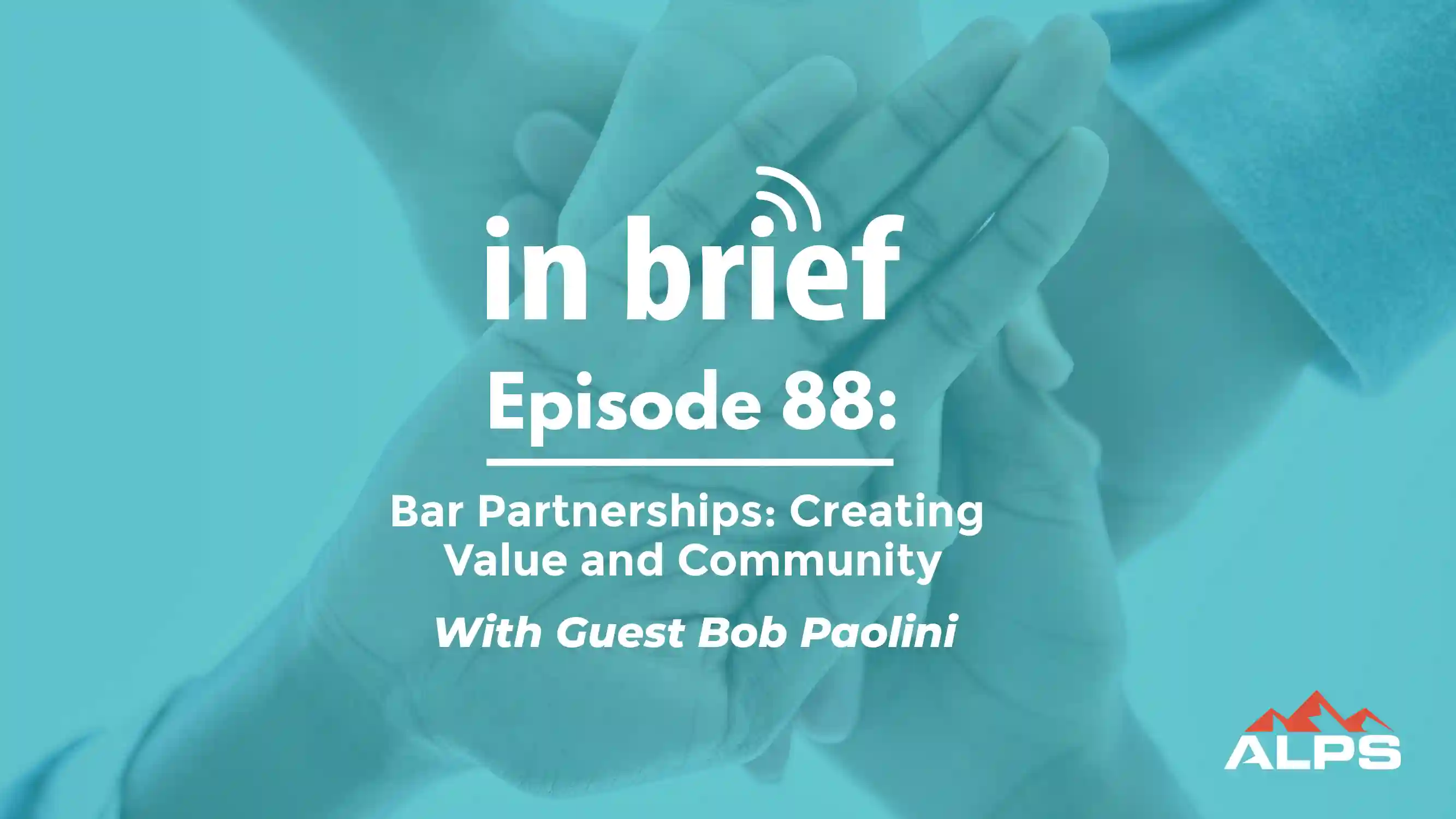
In this mini episode of ALPS In Brief, our Bar & Affinity Partner Strategist Rio Peterson sits down with Bob Paolini, Executive Director at the...
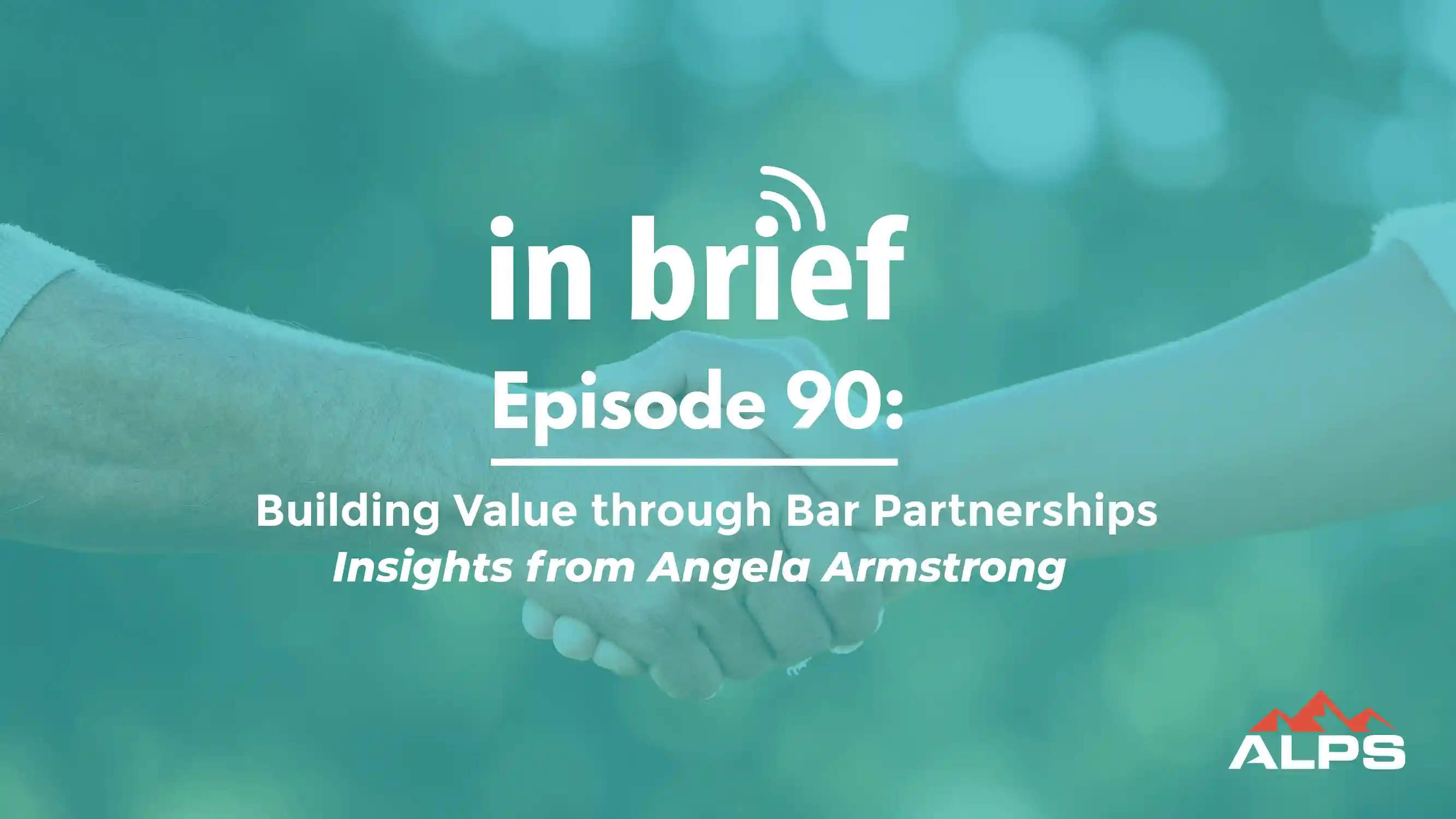
In this mini episode of ALPS In Brief, our Bar & Affinity Partner Strategist Rio Peterson sits down with Angela Armstrong, Executive Director at the...
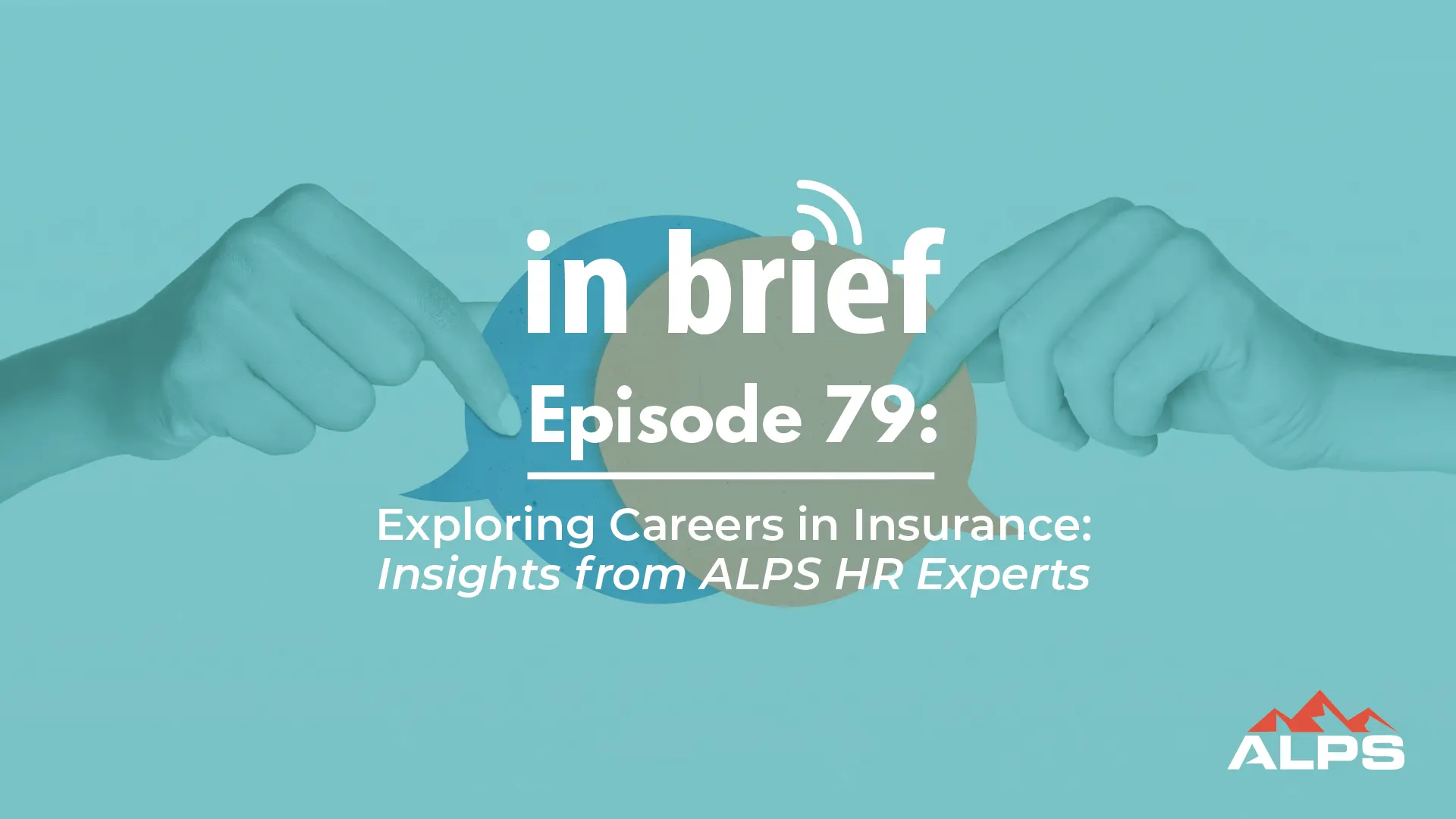
In this episode of ALPS In Brief, our Bar Partnership Strategist Rio Peterson sits down with Liesel Brink and Amber Kuhlman from the ALPS HR team to...